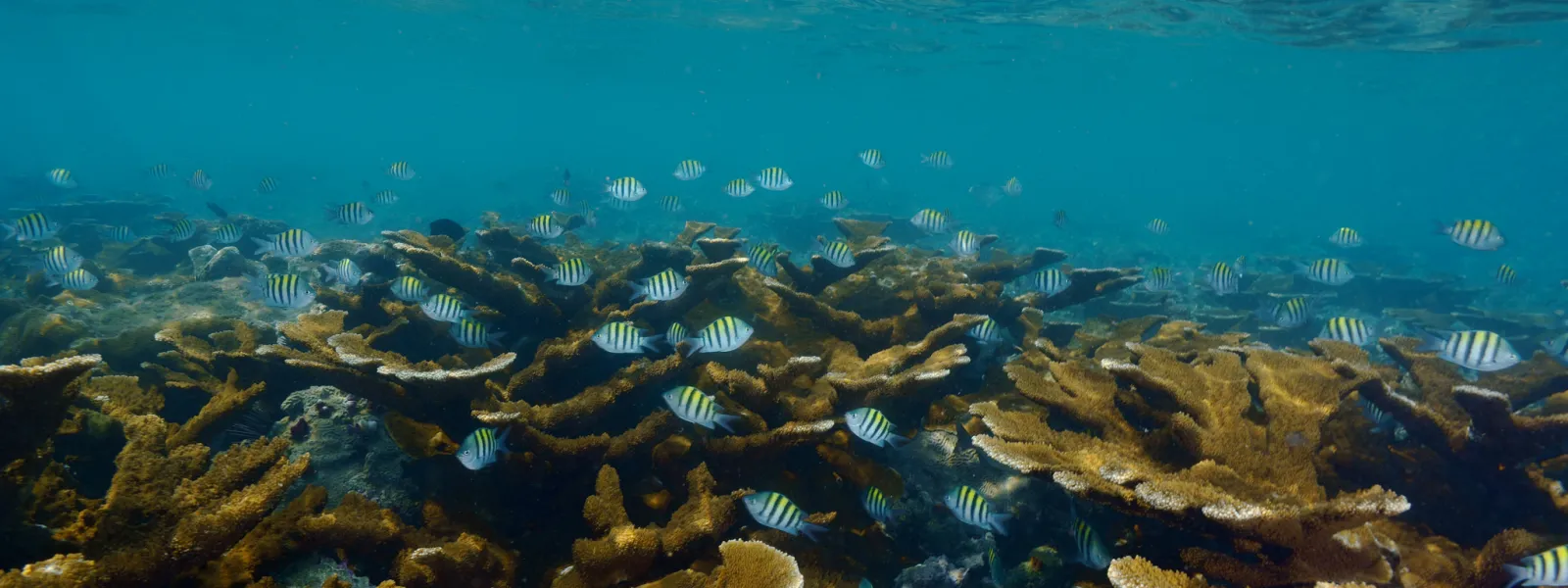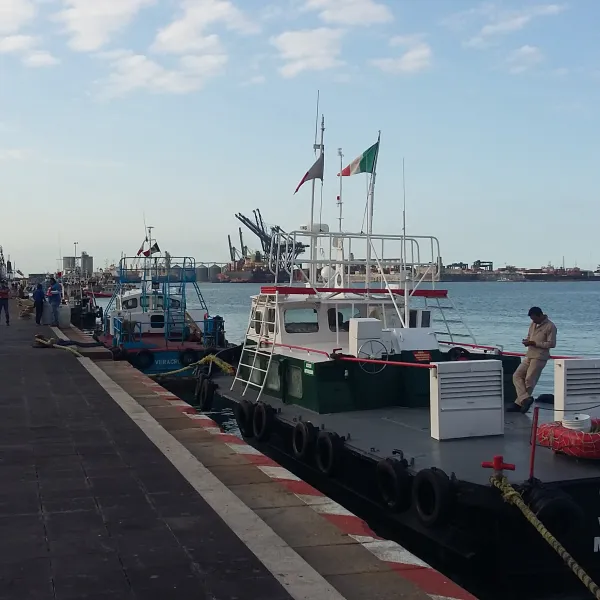
Project
Photo: Manuel VictoriaDefending the Veracruz Reef from a port expansion project
In the Gulf of Mexico, 27 coral reefs form a submarine mountain range running for miles between six islands. Hundreds of colorful fish species, sea urchins, starfish, and sea grasses share the reef with an abundance of other life forms. Fishing, sport diving, and beach tourism thrive along the coast. This is the magnificent Veracruz Reef, the largest coral ecosystem in the Gulf.
In 1992, Mexico’s government declared the Veracruz Reef System a Natural Protected Area. In 2004, it was listed as a Wetland of International Importance under the Ramsar Convention, a treaty for the protection of wetlands including reefs.
Despite the reef’s recognized significance, in 2013 the government reduced the size of the Natural Protected Area and approved a port expansion project. Local communities and organizations challenged the project's environmental permits, demanding protection of the right to a healthy environment.
On February 9, 2022, the Supreme Court of Justice of the Nation unanimously decided that the authorities violated the right to a healthy environment of Veracruz residents by authorizing the port expansion based on a fragmented environmental impact assessment. This means that the permits for the project are non-existent and that the impacts of the project on the health of the reefs must be studied again, this time in a comprehensive manner, and even the viability of the project.
The ruling is a historic precedent not only in Mexico, but for the entire region, as it allows access to environmental justice for the people neighboring an ecosystem affected by a project.
Partners:

Related projects

A Human Crisis: Climate Change and Human Rights in Latin America
This report shows that global climate change is already negatively affecting the enjoyment of human rights in the Americas and that present impacts will likely intensify in the future. The purpose of this report is not to provide an exhaustive list of all possible climate change consequences. Rather, we provide a summary of those impacts that are best supported by current evidence, most directly attributable to global climate change, and have the greatest potential to affect the human rights of people and vulnerable communities in Latin America. Read and download the report
Read moreBrazil boycotts OAS meeting over Belo Monte Dam
Government refuses to meet affected community leaders at Human Rights Commission. Washington, D.C.—The government of Brazil refused to attend a closed hearing convened by the Inter-American Commission on Human Rights (IACHR) of the Organization of American States (OAS) today, taking a stance that threatens to set a chilling precedent for human rights and sustainable development throughout the Americas. The meeting, scheduled for 2pm, was intended to foster dialogue toward resolving conflict and discuss failures in protecting the rights of indigenous peoples threatened by the proposed Belo Monte hydroelectric dam in the Amazon Basin’s Xingu region of Brazil. Plans for the Belo Monte Dam ignore international protections such as the right to free, prior and informed consent, and jeopardize the health, livelihood and ancestral lands of thousands. “The government’s constant refusal to dialogue and its undiplomatic posturing shows its negligence as it sidesteps the law and ignores the rights of local peoples,” said Sheyla Juruna, a leader of the Juruna indigenous people who are affected by the proposed dam. “I am appalled by the way in which we are treated in our own land without even the right to be consulted on this horrific project.” Brazil’s refusal to attend today’s hearing is only its most recent rebuke to the IACHR, a bulwark of human rights protection in the Americas for more than 50 years. The government has not only ignored an IACHR request to halt the project in order to consult with affected communities, but also withheld its dues and recalled its ambassador to the OAS in protest of the IACHR, according to press reports. Brazil’s intransigence is similar to that of Peruvian strongman Alberto Fujimori’s regime, which took a similar stance against the OAS in 1999. “This flies in the face of the image Brazil promotes of a regional leader and host of important international environmental events like Rio +20 next year,” said Attorney Jacob Kopas of the Inter-American Association for Environmental Defense (AIDA), a nonprofit environmental and human rights organizations representing affected communities. “With this decision, the government is shooting itself in the foot,” said Andressa Caldas, Director of Global Justice. “Should Brazil be granted a permanent seat on the UN Security Council when it undermines human rights institutions like this?” Organizations supporting communities affected by the dam, including the Xingu River Alive Forever Movement, AIDA, Amazon Watch, Global Justice and the Para Society for Human Rights, call on Brazil to comply with its international commitments and engage in a meaningful dialogue on human rights.
Read moreJury finds former owners of lead smelter liable for $358.5 million in damages
Doe Run Investment Holdings Company, Fluor Corporation and A.T. Massey Coal knew that lead pollution was harming children’s health. St. Louis, Missouri — Last Friday, the former owners of a lead smelter in Herculaneum, Missouri, were found liable for $320 million in punitive damages for negligently exposing 16 children and other residents living in the area to harmful lead pollution. “They obviously wanted to send a message: Don't choose profits over people,” said Mark Bronson, a lawyer for the plaintiffs, to the St. Louis Post-Dispatch. The jury awarded $320 million in punitive damages last Friday, July 29, against the Missouri-based Doe Run Investment Holdings Company, Texas-based Fluor Corporation and Virginia-based A.T. Massey Coal, corporations that owned the smelter prior to 1994. A day earlier, a civil judge had ruled that the three companies would have to pay $38.5 million to the families as compensation for health problems and lost lifetime earnings as a result of pollution that occurred between 1986 and 1994. It should be noted that according to court documents the current owner of the smelter, Doe Run Resources Corporation, had already reached a settlement with the plaintiffs for an undisclosed sum. This settlement covered the impacts of harmful pollution that occurred after 1994. DOE RUN PERU AND THE CASE OF LA OROYA Doe Run Resources Corporation is a subsidiary of Renco Holding Company, owned by Ira Rennert. After buying Doe Run Resources, Renco purchased the La Oroya Metallurgical Complex in 1997 and established another subsidiary, Doe Run Peru (DRP), to operate it. DRP has kept the La Oroya smelter idle since 2009, and is negotiating with the government to reopen it. AIDA and the SPDA have worked since 1997 to encourage the Peruvian government to hold DRP accountable for the pollution in La Oroya, which involves contaminants similar to those found in Herculaneum. The government demanded greater environmental controls at the metallurgical complex, which have not been fully implemented. This year, Renco Holdings began a process of international arbitration within the framework of the Trade Promotion Agreement between Peru and the U.S., arguing among other things that Peru has treated the company unjustly in requiring environmental improvements to the Complex. AIDA and the Asociación Pro Derechos Humanos (APRODEH) have brought a case and a request for precautionary measures on behalf of residents in La Oroya affected by the pollution before the Inter-American Commission on Human Rights. "The amount of damages awarded by the US court indicates the severity of lead contamination, particularly in children, and reminds us once again of the magnitude of human rights violations that have taken place in Missouri and in La Oroya," said Astrid Puentes Riaño , Co-Executive Director of AIDA. "So we insist on greater protections in La Oroya to address the situation there." Ramón Rivero, with the Sociedad Peruana de Derecho Ambiental (SPDA), praised the jury’s verdict and believes that it should be a model for similar cases in other parts of the world. “Measures such as the verdict against Doe Run in the United States are corrective actions taken by a government that aim to justly compensate those affected for the harm they suffered. We have to ask ourselves if the measures taken by the Peruvian government to date, with regard to the harm caused by DRP in La Oroya, comprise such just compensation,” said Rivero. “We need to take steps to protect public health that go beyond measurements and controls and that affect the wellbeing of the residents of La Oroya. We also need to evaluate the possibility of increasing the amount of compensatory damages that have been awarded,” Rivero concluded.
Read more